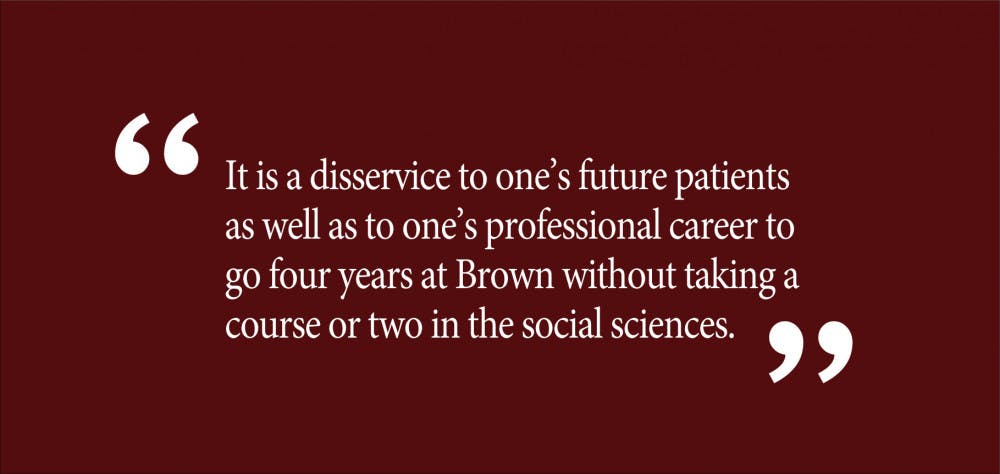Pre-med students coming into Brown often have their class list already mapped out for the next four years. This is understandable, since medical school requirements are so numerous and hefty. In many ways pre-med students lack flexibility in their course load because they are forced to take a number of classes like CHEM 0360: “Organic Chemistry.”
But they do have flexibility in the electives that they can choose. Pre-med students can supplement their STEM education by seeking out humanities and social science courses that also relate to their post-baccalaureate career. Social science disciplines such as anthropology and sociology can be invaluable to pre-med students, allowing them to tone down the STEM-oriented sides of their brains while teaching them the nuances of human interaction that are fundamental to careers in health care.
In the rat race of the pre-med world — in which students must fulfill premed requirements, gain clinical and research experience and study for the MCAT — it can be easy to forget the actual work that a medical career will entail: Namely, interacting with people and responding to their needs in an empathetic, culturally sensitive manner. Whether through primary care, discussing symptoms or anything in between, the primary work of a doctor is with people. It is therefore essential for doctors to understand the sociocultural factors that contribute to health. Even the most competent and passionate of doctors are susceptible to forgetting that a patient is a human being, too.
The social sciences can provide pre-med students with this sociocultural perspective on health. A medical anthropology course can help students consider the cultural as well as the biological basis of physical ailment. A sociology course can help them appreciate the social institutions that contribute to many elements of global health. A public policy course can show them how policy affects the healthcare industry and how the healthcare industry affects individuals.
It is important that doctors learn cultural competence. Doctors, on the daily, encounter patients with different socioeconomic, religious and ethnic backgrounds and different gender identities. Many pre-med students get experience in a hospital interacting with people. A social science course can supplement this experience by encouraging reflection on the myriad cultural factors affecting a person’s health.
An anthropology course at Brown heavily populated by pre-med students is ANTH0300: “Culture and Health.” As a pre-med student myself, I am finding that this course is making me consider aspects of health that I have not considered before, like the role played by economic prosperity in the decline of infectious disease.
Other anthropology classes at Brown can provide similar perspectives on human bodies and disease. “ANTH1720: The Human Skeleton” considers human skeletal remains in a more humane manner than is typical in biomedical contexts. Other anthropology courses on human evolution and bioethics are similarly beneficial. Many DIAP-desginated courses would also serve as useful, humanizing supplements to the sterile rigor of the hard sciences.
Within the traditional eight semesters at Brown as a pre-med undergraduate, there is more than enough time to take at least one social science course. Brown fills its Pre-Med/Pre-Health profession courses recommendation list with the basics: Two semesters of biology with lab, one or two semesters of mathematics, etc. But Brown also recommends that pre-med students take humanities courses, along with other social and behavioral sciences classes. These recommendations are not unique to Brown, as most other undergraduate programs have similar or identical lists. But given the academic freedom that Brown allows, it is all too easy for pre-med students to ignore this recommendation by taking only STEM courses.
Some medical schools are shifting toward an education that creates humanistic, culturally sensitive healthcare providers. It is thus in pre-med students’ best interest to keep up with the times by learning as early as possible about humanistic perspectives in health.
Brown’s Open Curriculum provides pre-med students plenty of opportunities to gain more nuanced views of healthcare before they enter the field. It is a disservice to one’s future patients as well as to one’s professional career to go four years at Brown without taking a course or two in the social sciences.
Rachael Schmidt ’21 can be reached at rachael_schmidt@brown.edu. Please send responses to this opinion to letters@browndailyherald.com and op-eds to opinions@browndailyherald.com.





